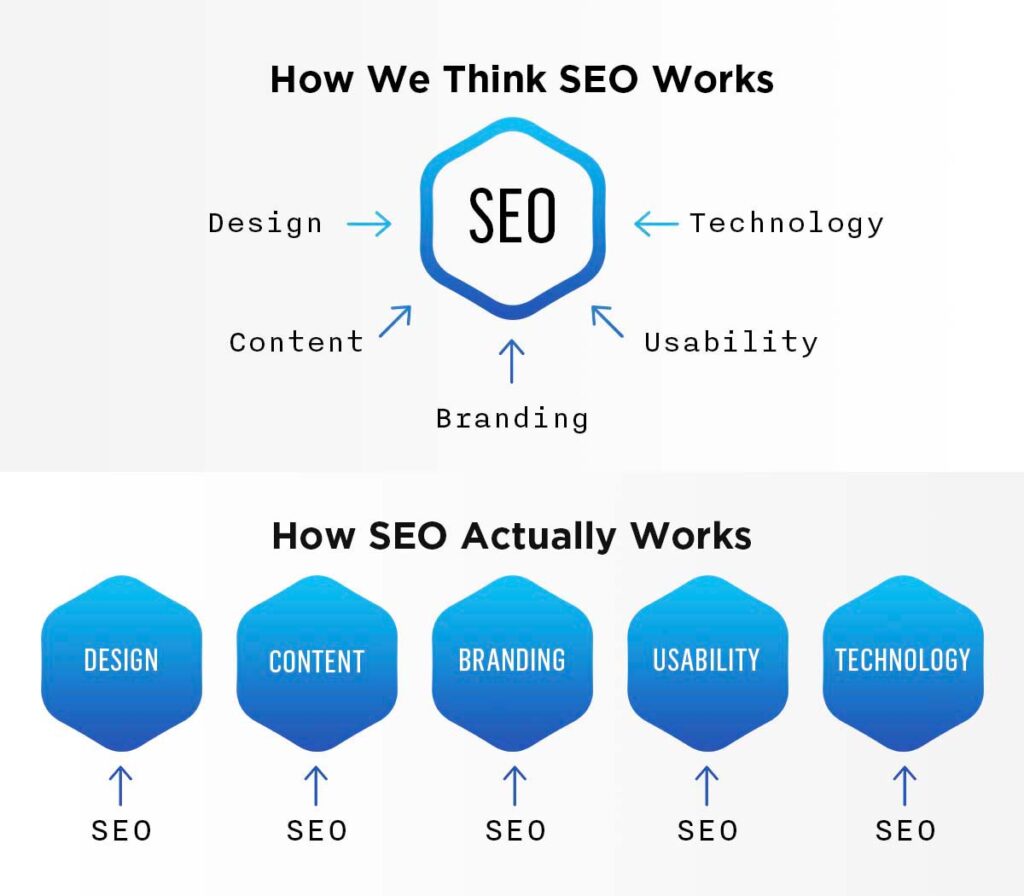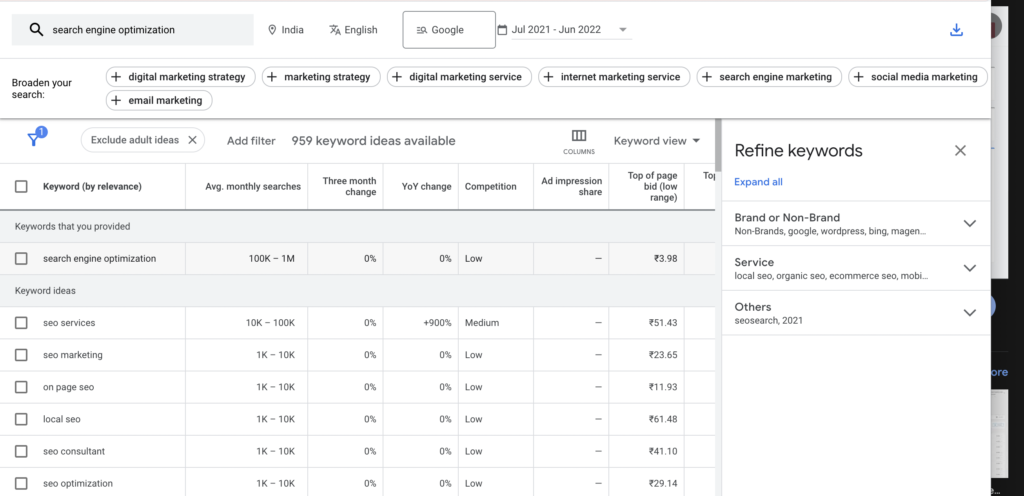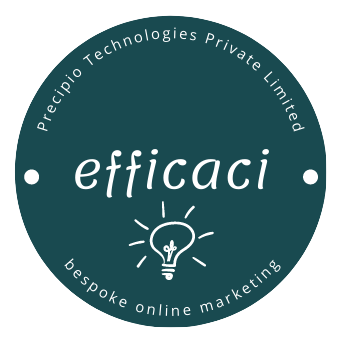Brief, unnecessary history
Search Engine Optimisation is a common enough term almost anyone online understands. However, this article is an eagle’s eye-view on SEO for beginners. SEO has been there for ages. According to multiple online sources, the acronym ‘SEO’ was first coined in 1997, about 34 years ago, predating all popular search engines. The 1990s saw many search engines – Excite, AltaVista, Infoseek, Ask Jeeves, Lycos, Yahoo [1994], google [1996] and others.
The credit of coining ‘search engine optimization’ goes to the manager of the rock band (probably Bill Thompson), Jefferson Starship. He came up with this when he was upset about the rocks band’s official website ranked on the 4th page of a legacy search engine and not at position 1 on page 1. We credit this information to Bob Heyman, Managing Partner, Digital Engagement Group.

What is SEO?
SEO or search engine optimization is a method of building or organising your website [technical SEO] and its content [on-page SEO] and marketing it to search engines based on content, links and other off-site factors. [off-page SEO]. By the way, if you really want to brand your business and sky-rocket your marketing, please remember that Google is not the only search engine though it commands a market share of over 92% of the search market, as of June 2021.
Let us browse a simple list of how the entire process of SEO works.

The entire foundation of search engine optimisation is based on keywords or key-phrases. We should optimise each webpage on your website for a keyword for which you want that page to be found on the search engines. This works webpage by webpage and not the entire website.
SEO for beginners
So, Keywords
If the foundation is not good, your SEO skyscraper will not be stable. In this SEO for beginners guide, this is the most critical step of search engine optimization and if increasing relevant traffic to your website is a priority, this research and hard work is critical. Make a list of webpages that you want to appear on search engines.
Build a relevant audience or a customer profile with as much data as you can. Delve on it a little more and wear the customer’s hat. Think like him and write five (more the merrier) queries that he could use to search for your product or service. Make a list.
Make a comprehensive list of your top ten competitors. Check their websites, read their content and analyse their meta tags (keywords and other data defined in the backend code). This will help you generate more ideas and fill the gaps. Add to the list you are creating.

Look into long tail keywords (queries that are two or three words long). Long tail keywords or key phrases are important although they do not bring in much traffic. They bring relevant traffic; they are easier to rank for and are less competitive.
Use keyword suggestion tools. Google has an exceptional tool and there are many others you can use. On an important note, you can estimate the traffic for each suggested keyword, helping you to make an informed decision.
Move the list to your marketing think tank. Brainstorm and come up with the best ones. Prune the list to a maximum of 2 to 3 queries (keywords or key phrases). You see that they are just synonyms of each other and similar. These are your key phrases or keywords that you want that webpage to rank for.
And then? On-site SEO
For those who are beginners in SEO, begin with on-page SEO process. Implement the keywords or key phrases you choose everywhere when you market that webpage – blog posts, social media marketing posts that you may use for off-site marketing, the web page content and also into the meta tags -title, description and keyword tags (talk to your SEO guy, he will know). This process is also called on-site SEO or on-page SEO. Remember not to overdo it. Just a 2% integration will do (a.k.a keyword density). formula
While your team is doing this, remember that search engines look at your page differently. It differs from what you see. They see it in the HTML format (the code of the web page). So the keyword density that you would vary and it will be on a higher side depending on other variables. Nothing to worry.
Now, the webpage that you want to market needs to be optimised for click-through rates. Now, this is where your UX [user experience or design] team may get into loggerheads with the SEO team, but we can agree on a workable strategy. Optimising for CTR simply means the placement of ‘next step/action’ boxes at places where they are most visible and get more clicks.

Technical SEO
Technical SEO is about adjusting certain factors that have a direct affect the crawling and indexing of the webpage by search engines. Things like core web vitals, site speed optimization, hreflang tag, canonicalisations, structure data, etc. might sound Greek to you. However, these are important facts that need changing or adjusting. Your SEO guy can throw more light on these. SEO for beginners is not about technology, it is about marketing.
Off-site or Off-page SEO
Off-site SEO includes activities that are done away from your webpage or website. I will discuss a few of them here. Rest we will discuss in later posts, when I delve into their categories. These activities will include link building, press releases, brand building, local SEO, forums, events, guest posting, podcasts and reviews. You can find more help with other processes like content marketing, social media marketing, influencer marketing, search engine marketing, content syndication in other posts of this blog.

If the key phrases or keywords that you chose for marketing your webpage are competitive, it is critical that you do off-page SEO. Off-page or off-site SEO improves your webpage’s authority. It means that you are building your brand and goodwill. People will buy from a more authoritative website than from one that has lesser authority.
Link Building
When your content is spot-on, meaning, if it is informative, detailed, unique and well-written, other websites (relevant websites) would like to link to it, which is great. Organic link building has always been good for webpage health. Th more sites link to your webpage, the more link juice (Google jargon) you will get and you will have a better SERP [Search Engine Ranking Position]. Link juice flows top to bottom, so try to build links to webpages that have more authority than yours.
The past 20 years have seen a lot of changes in search engine algorithms that penalised many websites for building irrelevant links. Relevance is about friendly domains and related businesses. If link building were as easy, everyone would have links everywhere. Marketers fought with Kung Fu Pandas and Madagascar Penguins in a no-win situation (Panda and Penguin are a series of Google Search Engine Algorithm updates) and a losing game.
First, instead of changing a marketing strategy umpteen times, due to search engine updates, it is only wise to stick to an honest policy and a sustainable marketing strategy. Gaming the search engines is not your business. Leave it to the underground experts. Focus on your core competence, running your business. More relevant links to your webpage means more goodwill and more authority.
Press Releases
Press releases traditionally are announcements in the press like newspapers, magazines, etc. In the online space, we relegate press releases to the same stature. However, in the recent years, they have become great marketing tools used for link building.
Any new event or announcement, propagated digitally, gets anywhere between 10 to 25 links from good, authoritative websites. So, today, it is critical that everything your business does should see the digital press. Press releases also drive tons of referral traffic, improve brand awareness, and positions your business as a thought leader in the domain, bringing in trust signals.
For good content creators, PR is the greatest tool when for beginners in SEO. Write a great story, link your digital assets and ensure that you publish a press release frequently. Yes, releasing a press release costs money, but the advantages it brings in are tremendous.
Brand searches
Gone are the days when people never used a brand name to search for something. Today, if you want to buy a pair of scissors, your search will be for ‘Belmont Scissors’ or ‘Scissors on Amazon.’ In both cases, you are searching for brands. This is where a branding exercise becomes critical to your business.
“Search queries in the SERPs for your brand name are vital touch-points for both people and machines and are therefore essential to your business. You should track, evaluate, and improve them consistently.”
Jason Barnard, Founder & CEO at Kalicube
Your brand building exercises will help search engines understand your brand credibility, which improves your rankings. Building a brand will also ensure that you get mentions and links across the web naturally. People or other business want to associate with others who are famous. Get set to ignite your branding. Brand SERP is the new visiting card today.
Local SEO
If you are a brick and mortar business, localised to an area or city, SEO can be a completely different ballgame and you can reap fantastic benefits from it. Two off-page practices like Google My Business and citations can boost your popularity manifold.
4 in 5 searchers and over 40% of Google searches are for local information. If you can get Google My Business optimised listing on maps, it will help tremendously. If the locality is highly competitive, you or your competition will certainly show up on local maps.

Citations are equally important, especially on the map pack. Also, the NAP (Name, address, Phone Number) should be accurate and working. Any deviation from accuracy here is seen as incoherency, and the searcher may not bother finding you ever again. So, leveraging local search is a double-edged sword, tread carefully.
Once everything is in place, you need to aim for the 3-pack SEO. There is no guarantee you will get there. But, good positive reviews (more numbers), complete and accurate listing can get there with time. We discover reviews later in this piece. This can be a great experience for beginners in SEO.
Forums
Forums are a great way to converse with people and build trust. Over the years, we have looked down on forums because marketers used them to build links and nothing else. However, look at the bright side, building links apart, you can showcase your expertise on the more popular forums like Quora or Redditt. In fact, many marketers have found major customers on forums by answering their questions patiently.
Forums are like cutting through the marketing mayhem and finding the right customer. Remember, the mindset of building links and the mindset of establishing expertise are completely different and until you are not breaking any guidelines, leverage forums. This is the best SEO tool for beginners.
Events
Events, especially online events, have become a part and parcel of marketing, thanks to the pandemic. Conducting events and webinars can be an exceptional idea to brand your website. Create a buzz around these events and they will contribute handsomely to your off-page SEO practices.
When organised well with a lot of fanfare, events can help get much needed organic links and social media mentions, which will go a long way in branding. Though a little money and logistics are involved, events can get you a lot of word-of-mouth and branding.
Follow up your event or webinar with a press release and you will get lots of marketing traction.
Guest Posting
Guest posting is writing a blog on someone else’s website. The most valuable tool in off-site SEO, guest posting, done with the right intent and strategy can get you easy customers. Though many marketers see guest posting as a link-building tool, that should not be the only aim to pursue.
We should guest post intending to put your expertise in front of a distinct set of audience, of course, related audience. If the content is good and informative, people will only flock to your website for more..
Podcasting
Podcasting is growing like crazy these days, and it can be a wonderful brand building tool. Over 75 million Americans listen to podcasts every month. And, if you are not in on podcasting, you are missing out a vast audience.
Podcasting is a great way to reach new audiences and talk to them convincingly. You may wonder if it is an off-page SEO tool. Yes it is, because Apple’s podcasts are a search engine and people find you by keywords in the title. Of course, Google podcasts too, have the same feature. Beginners in SEO should take on podcasting for better results.
Reviews

Reviews comprise in Online Reputation Management [ORM]. Almost all online buyers look for reviews before buying and about 93% of online purchases are affected by this.
“Perhaps the most underrated benefit of collecting reviews is that, when implemented properly, reviews can help Google better understand your site. The common understanding is that Google uses them to derive brand signals, which can boost your site’s domain authority and eventually your position in search.”
TrustPilot
So, as an off-page SEO factor, positive reviews are very important for conversions. ‘Trust’ is the basic ingredient of all buying decisions, online or offline. Collecting positive reviews is critical to building a great brand, besides good business. And, if you are doing local SEO, reviews take the front seat for the 3-pack SEO.
SEO for beginners…
SEO is a game, played best with honesty. It is easier and cheaper to market online than offline. So, make the most of the game and grow your business sustainably. This SEO for beginners article is just the tip of the iceberg and you will understand better as you learn more and practice.

Artificial Intelligence Blogging Brand Equity Brand Journalism CWV Email How To link building Marketing Online Advertising Optimizing for Search Pandemic Scholarly Articles Social Media Promotion Trends Updates Why To


0 Comments